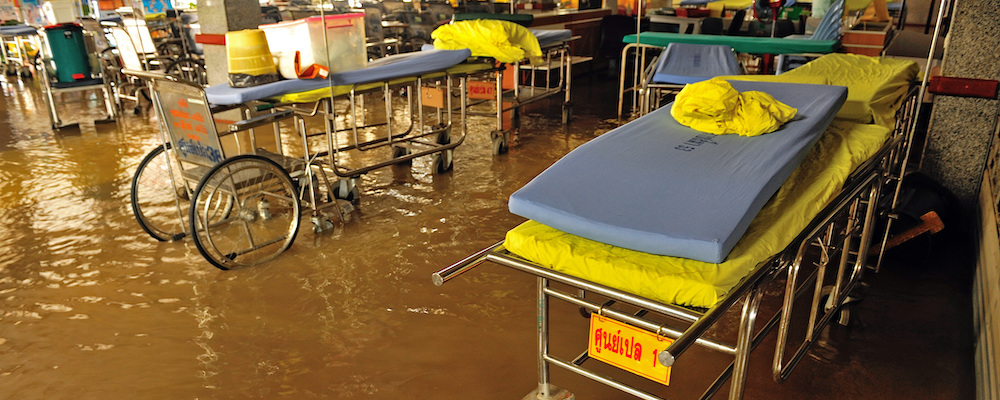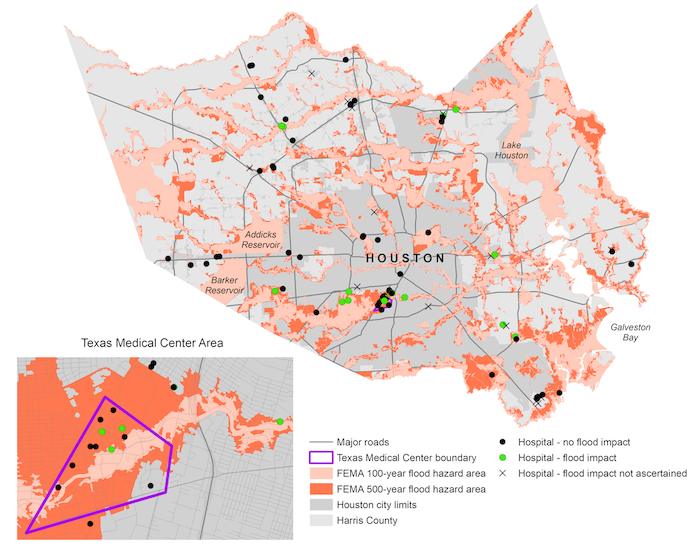 Image: Shutterstock Images
Image: Shutterstock Images
When hurricanes strike, hospitals can’t hunker down and weather the storm like many other organizations do. Instead, these critical care providers are called on to do more—even while struggling with impacts such as flooding, power outages, and limited transportation options.
The need for hospitals to be especially well-prepared for hurricanes piqued the interest of former Natural Hazards Center Graduate Research Assistant Emma Hines following Hurricane Harvey, leading her to make it central to her thesis work.
In August 2017, Hines watched as Hurricane Harvey caused record rainfall, dropping between 40-60 inches of rain over coastal Texas and leaving large portions of the greater Houston area underwater. Media coverage during the storm indicated that hospitals were being victimized by the hurricane and were struggling to evacuate patients in the midst of building and roadway flooding, high winds, and low food supplies.
In light of these reports, Hines—who was a master’s student at the University of Colorado Boulder at the time—felt it was crucial to understand these hospitals’ experiences with the hurricane and the lessons they learned in the aftermath of the storm. She began exploring these themes using GIS and qualitative analysis.
By mapping the hospitals across Harris County, Hines was able to show that hospital flooding occurred both inside and outside FEMA’s flood hazard areas. This is perhaps to be expected, however, considering much of the land flooded by Hurricane Harvey in Harris County was also outside FEMA’s flood hazard areas.

Hines was especially interested in Harris County hospitals’ historical experiences with flooding, their successes and challenges in the preparation for and response to Hurricane Harvey, and the current state of hospital flood preparedness in Harris County, which prompted an in-depth qualitative analysis. Using surveys, interviews, and document analysis, her study revealed that hospitals executed a well-coordinated and advanced response to Hurricane Harvey, guided by past experience with extreme flooding (e.g., Tropical Storm Allison) and a strong regional healthcare coalition. Despite the successes, Hines found that it would be advisable for Harris County hospitals continue to improve their flood preparedness efforts to minimize the impacts of future flooding events.
Hines compiled these results in her thesis, titled “Hospital Experiences with Hurricane Harvey in Harris County, Texas,” which she successfully defended in April 2019.
Hines was able to conduct interviews in Harris County and present her findings at the Annual Meeting of the American Association of Geographers in Washington D.C. thanks to generous awards from the Center to Advance Research and Teaching in the Social Sciences, the United Government of Graduate Students, and CU’s Department of Geography.
Since completing her thesis, Hines has gone on to work as an ORISE Fellow with the Climate and Health Program at the Centers for Disease Control and Prevention in Atlanta, Georgia. The Climate and Health Program empowers communities to protect human health from a changing climate. Some of the program’s main functions are to build the evidence base by evaluating health risks, impacts, and solutions; expand capacities across sectors; cultivate decision-making tools, and tell the story about how a changing climate changes health. In addition, the program’s Climate Ready States and Cities Initiative (CRSCI) funds 16 state and two city health departments to prepare for health effects related to climate change.

The main focus of Hines’s ORISE Fellowship is the risks and impacts of flooding on healthcare infrastructure, which was inspired by her thesis work and the clear need for additional research on the topic. However, she has also been able to work on a variety of other climate and health topics—such as heat-related illness and global pollen trends—and provide technical assistance to the CRSCI grantees.
“Overall, I hope that my thesis work will contribute to our understanding of how U.S. healthcare systems remain vulnerable to flooding,” Hines said. “I think it can provide valuable insights for how hospitals can better prepare for, respond to, and recover from future catastrophic flooding events like Hurricane Harvey,” Hines said.
Those who would like to learn more about Hines current and past work are free to contact her at Emmanuelle.Hines@Colorado.EDU.